Summer Research Experience Exposes Undergrads to Bioimaging at Illinois
August 24, 2015
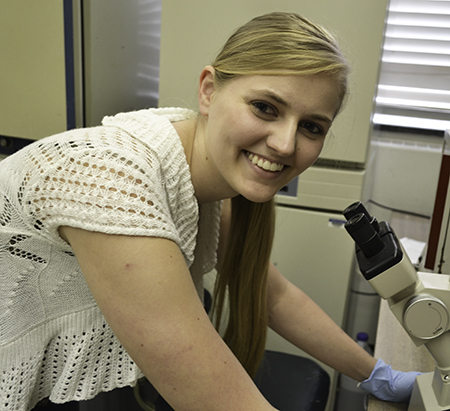
Bioimaging REU student Maura Slattery
One goal of the NSF-funded Bioengineering REU (Research Experience for Undergraduates) was that students who participated this summer would consider going to graduate school, and hopefully in bioimaging—and it appears they might have achieved that goal. The ten undergrads who participated in the REU not only performed cutting-edge bioimaging research; they also found out what grad school is like, and some even decided that the area they researched this summer might be the career for them—and that Illinois is the place to prepare for it.
During the 10-week program from May 26–July 31, 2015, these undergrads were mentored by their research professors and graduate students, received in-depth training about their subject matter and, of course, performed research, During joint seminars with other campus REU programs and SROP (Summer Research Opportunities Program) evening seminars, students received training on how to do research, write a research paper, give a presentation, create a poster, and develop a CV or a resume. Students even created and presented a poster about their research at the summer's end as part of the Illinois Summer Research Symposium.
Bioimaging REU PI Stephen Boppart believes that his field's intriguing data visualization, coupled with its potential to help people—high on young people's wish list in terms of their career choices nowadays—could serve to pique students' interest in research:
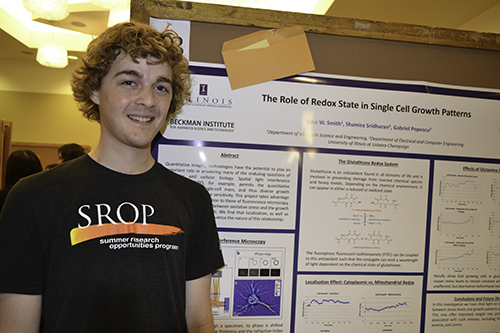
Bioimaging REU student John Smith presents his research at the Illinois Summer Research Symposium.
"Images are not only 'worth a thousand words,'" he acknowledges, "but they can amaze, fascinate, and instill wonder and curiosity. Many images can also be artistic and creative. The more technical images in biomedical imaging also connect the visualization of data to important information in biological and medical science. They tell us something about the molecules, cells, tissues, or organisms we are trying to investigate, and can be diagnostic to help patients."
Boppart also believes the REU participants got to experience "life as a graduate student in a research lab." In addition to learning essential professional development skills, he indicates, "They each discovered new things in their research projects, as well as in themselves. I think our students matured professionally, intellectually, and socially."
According to Boppart, the goal of the REU was to "to use bioimaging as a way of grabbing the attention of students and sparking their interests in graduate school, research, and making a impact in biological discovery or in the lives of patients." And he believes he and his team, including Co-PI Prof. Andrew Smith, Dr. Marina Marjanovic, and BioE grad student Joanne Li, who all made significant contributions to the program, succeeded in several of those goals.
"Many did say that they were now planning to apply to graduate school," he reports. " And many plan to apply to UIUC specifically," he adds. For instance, several of the students, like Susan Ojo, now intend to go to grad school as a result of participating in the Bioengineering REU.
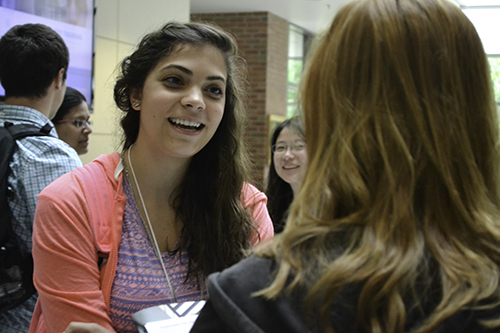
REU participant Casey Troccoli chats with another REU student at the REU Orientation in early summer.
Susan Ojo
A junior in Mechanical Engineering at University of Maryland-College Park, Susan Ojo says this experience was her first “working with so many people in a lab in a real research setting.” She also indicates that participating in the REU gave her a different perspective about going to grad school:
“It was great seeing so many different projects and seeing all the labs, because before this program, I didn’t know anything about graduate school. I didn’t even think I was interested, so it was really helpful in figuring out what I want to do after graduation.”
Did it change her mind about attending grad school?
“It did,” she admits. “I didn’t think grad school was for me, but now I’m more interested in it, and I’ll actually look up labs that I’m going to apply to.”
The main impact the research experience had on Ojo involved her setting long-term goals for herself:
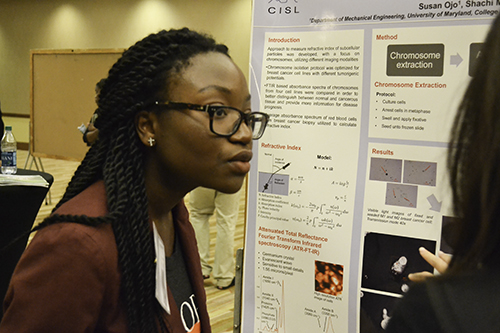
Susan Ojo presents her research during the Summer Undergraduate Research Symposium.
“I would say I manage my time more wisely now. I have a clear goal set in mind that I know I want to do research after graduation, so when the semester starts I’m going to start doing things to prepare myself for that.”
Ojo also indicates that she learned how research is actually done.
“So when I go back to my lab, I have a better idea of what’s the proper way to do things, looking at research journals. Before this I didn’t actually research what I was doing, I just got into it. So now I look at studies. Just becoming a better researcher.”
Did the research opportunity help her make up her mind about choosing research as a career? While Ojo did not indicate one way or another, she did learn that research is a lot of hard work, but it's quite rewarding.
“You have to want to do it. It’s not like a backup plan. It’s really hard. The people in my lab work more than 40 hours a week, so if you want to do it, you have to do it. You’ve got to be committed to it. But it’s good. It’s rewarding. Every day there’s new discoveries. You don’t get a task; you pick your task, and you see it develop. It’s rewarding.”
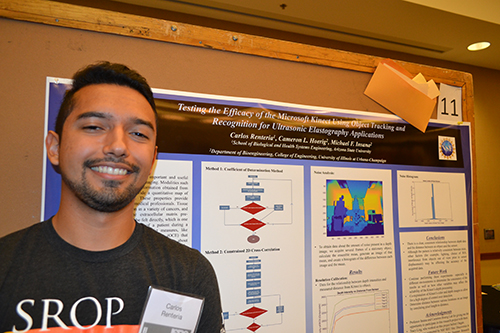
Carlos Renteria, a rising senior in Biomedical Engineering at Arizona State University.
Carlos Renteria
Another student for whom participating in the REU helped him decide on his career path is Carlos Renteria, who indicates that he now wants to get a Ph.D. in bioengineering and eventually go into research. The area he intends to research: biomedical imaging. He shares the impact the REU had on him:
“It really helped me grow aware of what my strengths were and what my strengths weren’t,” admits Rantaria. “Right off the bat, I knew I wanted to go into biomedical imaging. I didn’t have too much of a strong background in image processing...So it helped me develop my programming skills as well as my familiarity with the mat lab software and the imaging processing tool kit from that software. It helped build my strengths for the specific thing I am interested in going into.”
Maura Slattery
Bioengineering REU participant Maura Slattery, particularly appreciated the practical, career-related training they received.
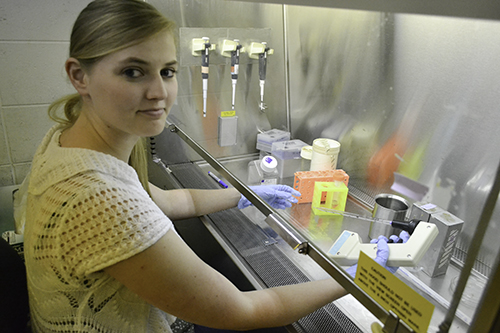
Bioengineering REU participant Maura Slattery, a rising junior studying Biochemistry at St. Xavier University.
“We’ve looked into applying for fellowships with NSF, and how to write a CV, and how to write a cover letter, Slattery explains. "You look online, it kind of helps you. But actually sitting through a seminar having people who’ve done it before tell you the mistakes they’ve made, the proper way to do things—for me it’s probably one of the biggest things I’ll get out of this…knowing how to be a good candidate for graduate school.”
Slattery, who wants to go to grad school believes the experience helped prepare her: “I feel that now I have a sense of what grad school would be like and what’s expected. That, I think, is probably the biggest thing I’ve gotten from this program is just getting to see what is expected in grad school.”
For Slattery, who did ALS research at Northwestern in high school, the experience confirmed that, yes, she wants to do research in neuroscience:
“Prior to coming here, I already knew I was interested in neuroscience,” she admits, “and being able to continue that has just been a joy.”
Slattery’s research involved using a 3D structure, a microtube array, to grow neurons, which would enable researchers to study the growth of neurons and also neuro-regeneration, which would be useful to treat people with spinal or brain injuries.
Casey Troccoli
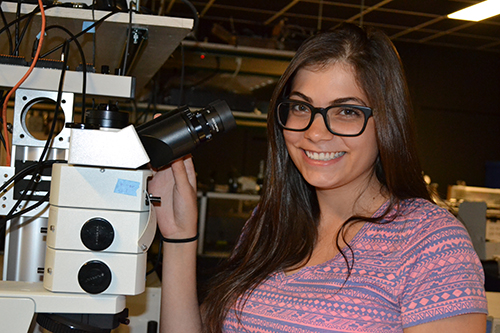
Bioimaging REU student Casey Troccoli
Casey Troccoli also indicates that participating in the Bioimaging REU helped her decide to attend grad school. The rising senior, who is double majoring in Engineering Physics and Optical Engineering at Rose-Hulman Institute of Technology in Terre Haute, Indiana, says this was her first experience working with a graduate student doing grad-school–level work, and it helped her see the importance of continuing her education.
“It’s definitely opened my eyes to the possibility [of research]. Right now, I’d still prefer rather to go to industry, but before, I wasn’t planning on getting any degree after college, but it did make me realize that getting a type of degree —in my terms the MBA—it’s a good opportunity. Any Masters would be better than nothing.”
Troccoli’s research this summer for researcher Stephen Boppart involved a tool that helps researchers understand the micro and macro environment of the tumor cell. The goal: to eventually create a tool to help doctors in the diagnosis and treatment of cancer cells: “Something that can be in a surgery room," Troccoli elaborates. "So this way, the surgeon can take the tool and just look at the area that he cut out and figure out right then and there if it’s good or if he needs to cut out more.”
Rachel White
Rachel White, a senior at the University of Delaware majoring in Biomedical engineering, says she definitely wants to go into research, and reports that the summer helped her “hone my focus and figure out what I really want to go into. I knew that I liked working with cells or working in a field where you’re learning about the body, but I wasn’t really sure outside of that what I wanted to do. This program is bioimaging focused, and that has really helped me learn that—I really like the fact that you can use these different imaging techniques to understand about the body, so that’s helped me figure out that that’s the path I want to go down.”
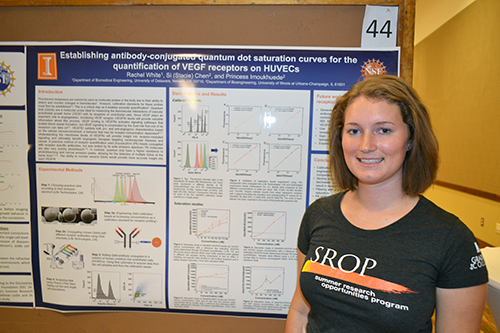
Rachel White presents her poster at the Summer Undergraduate Research Symposium held at the i-hotel.
White’s research this summer involved quantum dots, which White explains, “can be used to quantify different receptor levels on the surface of cells, but it takes some fine tuning in order to figure out the optimal environment for that to happen in.”
White appreciated being able to do in-depth research on a specific area: “I just want to talk more about how exciting it is to be involved in research. For me, I’ve been just really curious about learning how the body works, so this has been a really great experience for me, because I’ve been able to focus on a specific project essentially.”
White also appreciated experiencing the "big picture," from start to finish. She appreciated the opportunity “to learn as much as I could about that and also to really go from the start, because there are a lot of steps involved in the research that I’m doing. So to start at the beginning and go through all those steps and feel like at the end, I’ve been able to accomplish something and learn something about the research that I’ve been doing.”
Author/Photographer: Elizabeth Innes, Communications Specialist, I-STEM Education Initiative
More: Biology, REU, REU: Bioimaging, Summer Research, Undergrad, 2015
For additional istem articles about summer 2015 REUs, see:













.jpg)
















